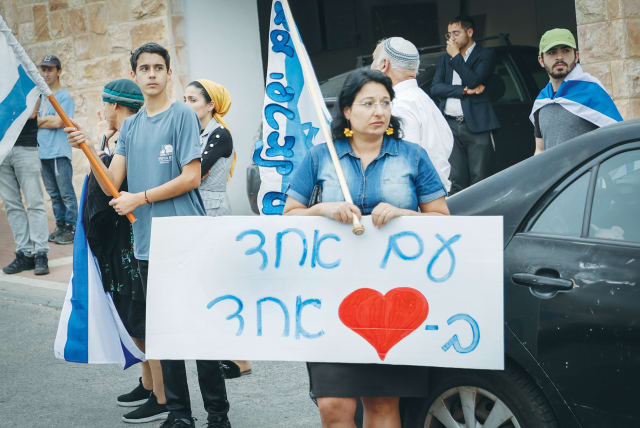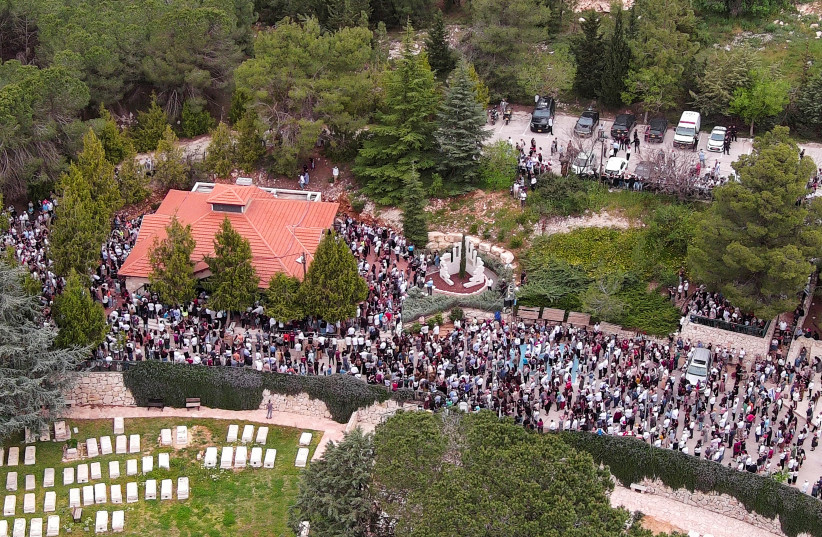My Word: Affronts and full-frontal assaults

“When so many brothers and sisters are being murdered, we must learn again how to be brothers and sisters.”
Some days, there’s a voice inside my head sounding like an internal GPS constantly telling me to “Recalculate.”
I’m being driven mad by the crazy pace of the news in Israel. It would be stressful even if I didn’t have to write a weekly column with an early deadline due to the holiday at the end of Passover, but I can’t ignore what happened at the beginning of the festival – which seems so much longer than a week ago.
In just a few days, over the holiday period, Israel was subjected to a multi-front assault. In a terrorist shooting attack in the Jordan Valley on April 7, sisters Maia and Rina Dee from Efrat were murdered and their mother, Lucy (Leah), left in critical condition, succumbing to her wounds on April 10. Also on April 7, Italian tourist Alessandro Parini, a 35-year-old lawyer from Rome, was murdered in a car-ramming in Tel Aviv in which several other tourists were wounded.
There were rockets from Gaza, Lebanon and Syria. And, technophobe that I am, I consider cyberattacks another front. With varying degrees of success, they hit universities, government offices, irrigation plants, the Israel Post and other agencies.
Each one of these fronts and attacks is worthy of attention. The murder of Maia, 20, and Rina, 15, hit particularly hard, because, although I didn’t know them, I can easily imagine the type of home they were brought up in both in the UK and in Israel. I can’t imagine, however, what the father, Rabbi Leo Dee, and surviving siblings – two sisters and a brother – are going through. Love and loss don’t work according to mathematical principles; it isn’t doubly hard to lose two children. The pain is surely infinite. Children shouldn’t be buried by their parents. It’s not the natural order of things. As I was writing this column, the news broke that the girls’ mother had also died. The writer in me again heard: “Recalculate.” But how do you reset to take in incalculable pain?
Maia and Rina were the third set of siblings to be murdered by terrorists in the past three months. Brothers Hallel and Yagel Yaniv, aged 21 and 19, were killed in a similar attack on Route 60 in Huwara at the end of February. And earlier that month, the Pally brothers – Yaakov Israel, six, and Asher Menachem, eight – were killed along with another Israeli in a terrorist car-ramming attack at a bus stop in Jerusalem’s Ramot neighborhood.
The cry of Esti Yaniv as she buried her sons – “Ahim anahnu” “We are brothers” – continues to echo. Rabbi Leo Dee had a similar message at his daughters’ funeral. Rena Ariel, whose daughter, Hallel, was murdered in her own bed by a terrorist in 2016 when she was 13 years old, also shared a message of unity on Facebook with news of the Dee daughters’ deaths.
“When so many brothers and sisters are being murdered, we must learn again how to be brothers and sisters,” she said.
After his wife died, in a truly inspirational speech, Rabbi Leo Dee declared April 10 as “‘Dees Day,” when “we can all differentiate between good and bad by sharing a picture with an Israeli flag.
“Let the Israeli flag today send out a message to humanity which is: We will never accept terror as legitimate. We will never blame the murder on the victims. There is no such thing as moral equivalence between terrorist and victim. The terrorist is always bad.”
The idea quickly spread throughout social media. His call for unity and humanity reverberated as he so nobly found a way to channel the pain.
One nation, fully divided
THERE IS no doubt that the country is split. It’s not only heartbreaking, it’s dangerous.
The terrorists who carry out their evil attacks need no excuse. They get all the encouragement they need from the “shahid” cult of martyrdom and the Palestinian “Pay-for-slay” policy, compensating the terrorists and their families for every person they murder. You don’t need to be a genius to calculate how much that adds up to as an incentive. The deadly toll is evident: Nineteen people have been killed by terrorists in Israel since the start of the year; 32 were murdered last year.
Ramadan should not be considered an excuse. It is not acceptable anywhere for worshipers to store weapons, rocks and incendiary devices in a house of prayer in preparation for attacks, but when it comes to al-Aqsa Mosque on Temple Mount, somehow we are meant to get used to it. There is a need to reconsider the policing and prevention of such incidents and also the dismal way in which Israel’s authorities handled the PR aftermath.
The Jordanian Waqf, the custodians of the Muslim holy sites on the Mount, should also recalculate: If it is in charge of those sites, as it claims, it must take action to prevent the worshipers from barricading themselves in the mosques with improvised weapons. Any way you look at it, it is a desecration and an affront.
Rocket attacks should not be treated as a “normal” occurrence. They are not acts of God but acts of war. The rocket barrage from Lebanon – some 35 of which were launched on April 6, the first day of Passover – was unusual for both the number of missiles and their origin across the northern border. But neither the rockets from Lebanon nor the three rockets from Syria on April 8 came completely out of the blue.
Consider the explosion at Megiddo Junction last month, in which one young man was seriously wounded, as an added warning. The fact that a terrorist armed with explosives managed to infiltrate from Lebanon to carry out that attack should have served as an alarm.
Israeli authorities appear to be placing the blame for the rocket attacks on Hamas and Palestinians rather than Hezbollah or the Lebanese government. Iran’s imprint is all over them. Nonetheless, added factors need to be taken into account.
A few days before the November election, when current opposition leader Yair Lapid was acting as prime minister he signed (with American urging) a maritime deal with Lebanese president Michel Aoun, also in his last days in office. Realizing that the deal would not pass in a Knesset vote, Lapid circumvented parliamentary approval, and ceded Israeli economic waters and potential gas assets to Lebanon. Lapid boasted this “will weaken Lebanon’s reliance on Iran, will restrain Hezbollah and will bring regional stability.” I noted at the time: “It’s hard to know whether this is spin or a dangerous whirlpool.”
Lapid and then-defense minister Benny Gantz both spoke of the deal in terms of a deterrent. While they might have genuinely believed they were buying peace, or at least calm, it was clear that they had underestimated the nature of the Iranian-backed terrorist organizations that control Lebanon. Hezbollah leader Hassan Nasrallah has recently been openly gloating about the fractures in Israel over the judicial reform. And as The Jerusalem Post’s Seth J. Frantzman noted this week: “Hezbollah doesn’t appear deterred, since it controls the area from which rockets were fired. In addition, Hamas leaders openly fly into Beirut and meet with Palestinian Islamic Jihad and plotted the attacks this past week during Passover.”
There’s definitely a need to recalculate the gas deal and the way it will be implemented in view of the rocket attacks from the North.
Other elements are at play: The upheaval over judicial reform is causing splits at home and abroad – notably with the US administration. Iran and its proxies no doubt consider this an opportunity not to be missed. They can read the placards and hear the rhetoric and count their blessings.
Lapid and the anti-reform camp were swift to condemn the terrorism while blaming the current government for its outbreak (as if there had been no wave of terror last year.) Israel’s foes don’t care about the proposed legislative overhaul. What they see is weakness: Israeli companies threatening to relocate abroad and pilots and other reservists refusing to serve for political reasons.
They also monitor the Israeli media which are largely supportive of the anti-reform camp. Prime Minister Benjamin Netanyahu announcing he would fire Defense Minister Yoav Gallant, backtracking in public only this week, also didn’t help.
It’s not a matter of arithmetic but simple political science that the number of terror attacks will multiply as long as the extreme divisions remain. It’s time to take stock and recalculate. The price of turning everything into a zero-sum game is too high.liat@jpost.com
Jerusalem Post Store
`; document.getElementById("linkPremium").innerHTML = cont; var divWithLink = document.getElementById("premium-link"); if (divWithLink !== null && divWithLink !== 'undefined') { divWithLink.style.border = "solid 1px #cb0f3e"; divWithLink.style.textAlign = "center"; divWithLink.style.marginBottom = "15px"; divWithLink.style.marginTop = "15px"; divWithLink.style.width = "100%"; divWithLink.style.backgroundColor = "#122952"; divWithLink.style.color = "#ffffff"; divWithLink.style.lineHeight = "1.5"; } } (function (v, i) { });

